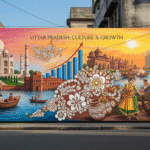A New Era for Silk Production: Karnataka, long known for its rich tradition of silk production, is now embracing cutting-edge sericulture techniques to further boost its silk industry. The introduction of advanced technologies and methods is driving innovation and improving both the quality and quantity of silk production, positioning the state as a global leader in silk manufacturing.
Key Developments in Sericulture:
- Technological Advancements:
- Karnataka’s sericulture sector has introduced precision farming methods, using advanced technology for monitoring and controlling the environment in silkworm rearing.
- Automated egg incubators, climate-controlled rearing rooms, and digital tools for monitoring silkworm health are improving yields and efficiency.
- The introduction of genetically improved silkworm varieties is helping produce better quality silk with higher tensile strength.
- Boost to Mulberry Farming:
- The state government has promoted the multi-cropping system for mulberry farmers, encouraging them to diversify their land use to increase productivity.
- Drip irrigation systems are being employed to ensure optimal water usage for mulberry cultivation, contributing to higher-quality feed for silkworms and increased silk yield.
Economic and Social Impact:
- Job Creation and Rural Development:
- The adoption of these advanced techniques has led to an increase in employment opportunities, particularly in rural areas, where sericulture plays a crucial role in the local economy.
- More than 30,000 families in Karnataka are involved in silk farming, with women contributing to over 50% of the workforce in sericulture-related activities.
- Quality and Export Potential:
- Karnataka produces over 60% of India’s total silk output, with a significant portion being exported worldwide.
- The enhanced quality of silk, achieved through these innovations, has increased demand in international markets, especially for Mysore silk, which is renowned for its fine texture and superior finish.
Sustainability and Green Practices:
- Eco-Friendly Innovations:
- The Karnataka sericulture industry is also focusing on sustainable practices such as reducing pesticide usage, promoting organic farming methods, and improving waste management from silkworm farming.
- Biodegradable materials are being adopted in packaging, aligning with global trends towards eco-conscious production.
Future Outlook:
- Growing Potential:
- With continuous innovation, Karnataka is set to maintain its leadership in the Indian silk industry, aiming for a 15% increase in silk production over the next five years.
- The state government plans to further invest in research and development, including partnerships with agricultural universities to develop more resilient silk varieties.



























